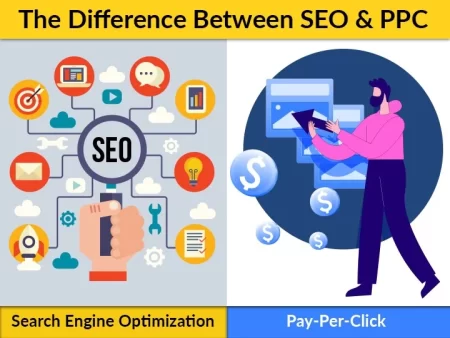 Two of the most important acronyms in online marketing today are PPC (pay per click) and SEO (search engine optimization). When you want to boost your brand’s visibility, you may be looking at these to discover which is better for your marketing budget when it comes to getting your business noticed online.
Two of the most important acronyms in online marketing today are PPC (pay per click) and SEO (search engine optimization). When you want to boost your brand’s visibility, you may be looking at these to discover which is better for your marketing budget when it comes to getting your business noticed online.
The Difference Between SEO and PPC
Simply put, SEO has to do with optimizing your website, so it ranks better in the search engine results (SERPs). On the other hand, pay-per-click marketing is a type of marketing that uses the paid options of your chosen advertising platform (e.g., Google, Amazon, Facebook, Bing). Typically, when you use PPC marketing, you’re paying to see your ad near the top of the SERPs. While well-optimized content may also be featured near the top, it’ll always be placed beneath the paid content. It’s important to know how to use both of these tools effectively in your marketing efforts today.
Both SEO and PPC have distinct advantages and disadvantages. For instance, one of the main advantages of search engine optimization is that, in theory, it’s free. All you need to do is create informative, well-written content that does a good job of using your target keywords that your target audience will want to read.
A Closer Look at SEO
When you go to a search engine and either type in what you want to find or use voice search to do so, you’ll usually find what you need on the very first page. This is because the website owner has used a combination of clever strategy and content creation to successfully have their content listed on the front page. Some of the things that are at work here include search terms (a.k.a., keywords) and properly optimizing your content once you’ve spent time doing research to find these keywords. This is vital because you don’t want to target keywords that nobody is searching for.
Besides creating helpful content that’s packed full of useful keywords, there are a few other things that you can do to give your site a boost in the SERPs. These include:
- Take advantage of online tools to check your content’s quality and ensure the proper density of your keywords
- Make sure that it’s easy for people to share your content on the various social media platforms
- Make sure that your content serves as a useful reference tool for your visitors
- Build backlinks from external websites to your most helpful content (this allows engines to see that your website is an authority on the subject)
- Use press releases to maximize how much exposure your content naturally receives
A Closer Look at PPC
Whenever the word ‘ad’ or ‘sponsored’ appears next to a result in the SERPs, that’s a PPC listing. If you click on their ad, they’ll pay a set amount for your click. This is based upon their ‘bid’ amount. Advertisers have identified search terms and placed a bid on how much they’re willing to pay to appear at a certain spot in the SERPs. Since this is a competitive industry with lots of businesses that want to get listed, bids can be quite high.
PPC is similar to SEO in that, to be effective, both of them require good research. Here you’ll need to:
- Spend time identifying the target keywords and key phrases that work best for your website’s niche
- Create your campaign targeting the correct geographic area and demographics
- Determine what a reasonable bid amount is and set up your daily budget
- Take time to ensure that you have a well-designed and worded ad
- Make sure that the site your visitors arrive on is easy to navigate and understand
- Actively monitor your results to see how your cost per click (CPC) and return on ad spend (ROAS) meet your expectations
The main advantage of pay-per-click is that you can create a campaign today and show up at the top of the SERPs immediately. If you’ve done your research and you have a decent budget, you’ll start seeing customers right away.
Local SEO Tampa in, Tampa, FL, only engages in the highest standards of search engine work. If you need help with your search engine strategy, contact us today.
You can access a video presentation of this blog here.
